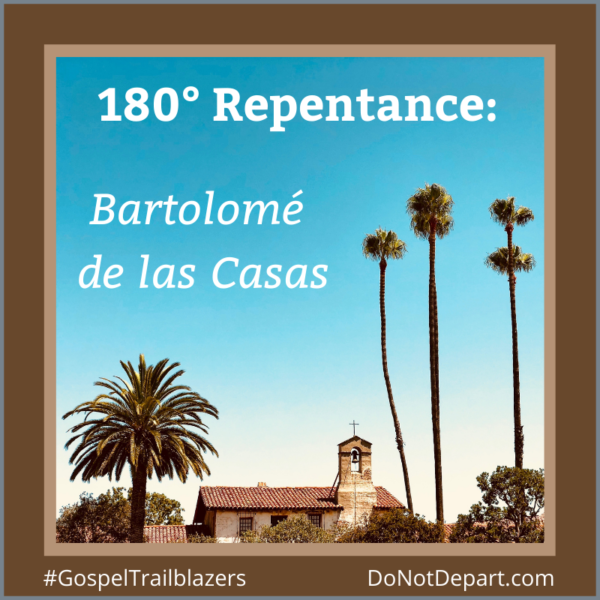Bartolomé de las Casas.
I had never heard of this man when I signed up for a one hour Spanish course by the same name my first semester of college. It was just one hour. A light addition to my pre-med course load, just to keep me using Spanish regularly. It seemed nonthreatening enough. I was so wrong.
On the first day of class, I and three upperclassmen learned that Bartolome de las Casas was a Spanish priest who lived 1485-1566 and that we would be studying his original writings on the topic of slavery in the New World. If I thought reading Shakespeare’s English was complicated, well, 16th century Spanish was something else. It’s just as well that Dr. Garcia refused to sign my drop slip the second week of school. (Two of the upperclassmen had beat me to it, leaving me as one of two remaining students.) The reading for this one hour course was brutal, but the introduction to Bartolomé de las Casas was unforgettable.

No Small Change: Slave Owner to Protector of the Indians
Bartolomé de las Casas was among the earliest European immigrants to the New World, settling in Hispaniola with his father in 1502 and becoming a land owner and slave owner in the Spanish encomienda system. He differs markedly from other missionaries we have looked at this month in that his relationship to the people group he served was initially exploitative rather than bearing the Gospel.
Las Casas participated in slave raids and the active enslavement of Indigenous peoples during his early years on Hispanola, including the conquest of Cuba in the years following his ordination as one of the first priests in the Americas. Years later he wrote, “What we committed in the Indies stands out among the most unpardonable offenses ever committed against God and mankind and this trade [in Indian slaves] as one of the most unjust, evil, and cruel among them.”
The words of visiting Dominican friars and Scripture began to affect his perspective. As he prepared for a Pentacost sermon, Las Casas was convicted of the injustices committed against the Indigenous people through the encomienda system and of his own participation in such atrocities. He responded by releasing ownership of his hacienda land and slaves and then traveling to Spain to advocate before King Charles V against the encomienda system of Indigenous enslavement.
Despite his clarity on the injustice of Indigenous enslavement, it was much later before he repented of initially advocating for the enslavement of Africans in place of Indigenous Americans. With time, he came to recognize that the enslavement of any people was wrong. In 1548 Las Casas wrote in Defense of the Indians, “Christ wanted love to be called his single commandment. This we owe to all men. Nobody is excepted.”
Las Casas also argued against forced conversions, which were common in the Spanish colonial Americas. After writing a treatise on the subject, Bartolomé de las Casas led a group of Dominican friars into Guatemala in 1537 to bring the Gospel to native peoples peacefully, employing the use of Christian songs to introduce and teach the faith. In this way, a number of local chiefs came to Christian faith, and several churches began in the area.
180° Repentance
As a young college student wrestling with the Spanish of the 1500’s and some very sobering Church history, I discovered that the arguments between Las Casas and his opponents centered on the question of whether the Indigenous were “barbarians” and thereby “natural slaves,” or fully human. It was with grief and horror that I saw how such terms have been applied to people made in the image of God to justify exploitation.
Today, as I look more closely at Bartolomé de las Casas’s personal history and early years, I am struck by his life trajectory, from fully entrenched in the enslavement of Indigenous people to the first appointed “Protector of the Indians” under King Charles V. I marvel at the way God revealed truth to Bartolomé and walked him through a full (though not instantaneous) 180° repentance, personally rejecting his former ways, and then fervently advocating for the protection of the people he’d harmed. Over time, God further developed Bartolomé’s understanding of the value of every human life.
I wonder if you noticed the similarities between the life of Las Casas and that of English slave ship captain turned abolitionist John Newton. The Apostle Paul also comes to mind, as God carried him from violent persecution of early Christians to missionary to the Gentiles. Our God is all about redemption. What hope it is to see how fully his grace turns our lives around.
Psalm 130
Out of the depths I cry to you, O Lord!
O Lord, hear my voice!
Let your ears be attentive
to the voice of my pleas for mercy!
If you, O Lord, should mark iniquities,
O Lord, who could stand?
But with you there is forgiveness,
that you may be feared.
I wait for the Lord, my soul waits,
and in his word I hope;
my soul waits for the Lord
more than watchmen for the morning,
more than watchmen for the morning.
O Israel, hope in the Lord!
For with the Lord there is steadfast love,
and with him is plentiful redemption.
And he will redeem Israel
from all his iniquities.
Lord, expose and uproot sin in my life.
May I be grieved by what grieves your heart.
May I see injustice for what it is.
May my heart be supple and responsive to your conviction, obedient to your leading.
Soften my heart in repentance and fill my life with redemption as you did the life of Bartolomé.
May my life be marked by a love for the people whom you made and love.
Amen.

[…] 180 Degree Repentance: Bartolomé de las Casas […]